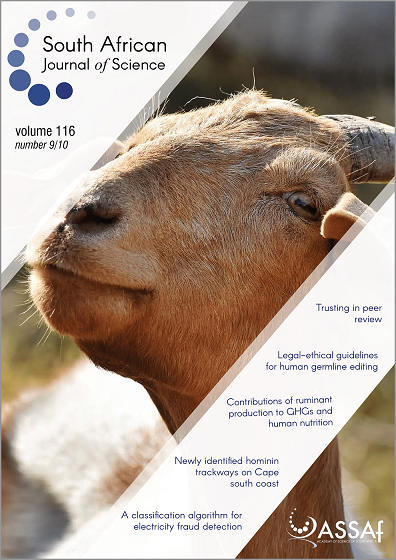Nutrient uptake, yield and taste of oilseed rape (Brassica napus L.) and soil chemical properties following amendment with uncomposted and composted tobacco waste and cattle manure
DOI:
https://doi.org/10.17159/sajs.2020/7846Keywords:
compost, organic amendment, organoleptic test, soil organic carbonAbstract
The inadequacy of the nutrient supply of most tropical and sub-tropical soils may be curbed through organic material recycling, thus reducing the need for mineral fertiliser use. To promote tobacco waste recycling in a smallholder food-cash crop production system, nutrient uptake, dry biomass yield and taste of oilseed rape (Brassica napus L.) and soil chemical properties were determined on a sandy loam soil under field conditions. The experiment was a randomised complete block design with three blocks and eight treatments, namely, control (no amendment), mineral fertiliser (121, 30.8, 24.6 kg/ha N, P and K, respectively), uncomposted tobacco leaf scrap (TSC) and compost of TSC and cattle manure (TSC-CM) at 5, 20 and 40 t/ha. N, P and K uptake and dry biomass yield of oilseed rape were higher (p<0.05) than control with 40 t/ha TSC-CM and mineral fertiliser application at 3 weeks after transplanting (WAT), while significant improvements with TSC were observed from 5 WAT. Mineral N, extractable P and exchangeable K were higher than control with TSC-CM at 20 t/ha and 40 t/ha at 3 WAT, and higher with TSC at 9 WAT. Soil organic carbon was more improved with TSC application than TSC-CM at 9 WAT. Organoleptic testing revealed an intensely bitter taste in oilseed rape with mineral fertiliser, 20 t/ha and 40 t/ha TSC at 3 WAT, although it diminished with time. A trade-off of nutrient uptake, yield, taste of oilseed rape and soil properties improvement is attainable with application of TSC-CM at 40 t/ha, while if composting is not feasible, TSC application at 20 t/ha is a viable alternative. Thus, judicious utilisation of tobacco waste offers a viable solution to the problem of low soil fertility on sandy soils and can reduce the need for mineral fertiliser use, while promising sustainable soil management.
Significance:
- The study underlines the importance of recycling of organic materials as a viable, environmentally safe and low-cost soil fertility management practice.
- The study presents pragmatic practices that may be adopted so as to optimise the benefits of use of tobacco waste on food-cash crop smallholder farms, given the increasing popularity of such farming systems in Africa.
Published
Issue
Section
License

All articles are published under a Creative Commons Attribution 4.0 International Licence
Copyright is retained by the authors. Readers are welcome to reproduce, share and adapt the content without permission provided the source is attributed.
Disclaimer: The publisher and editors accept no responsibility for statements made by the authors
How to Cite
- Abstract 907
- PDF 847
- EPUB 209
- XML 358
Funding data
-
International Foundation for Science
Grant numbers C/5764-1 -
Organization for Women in Science for the Developing World












.png)